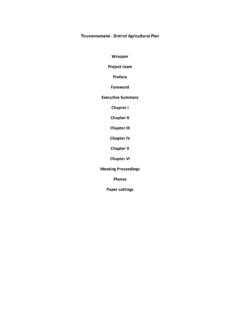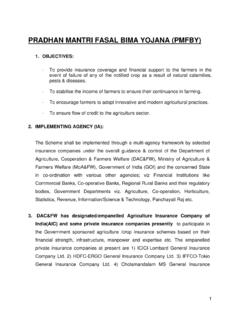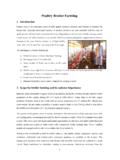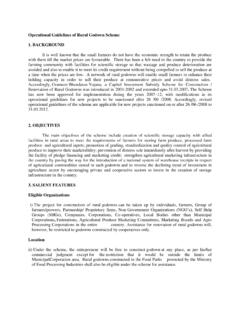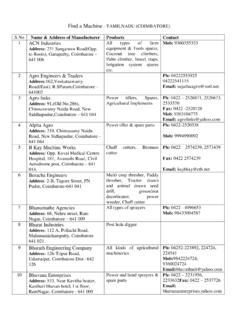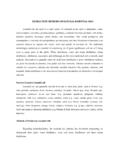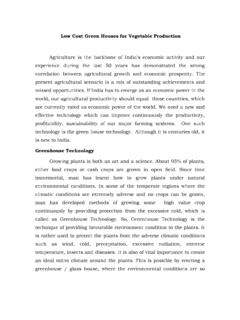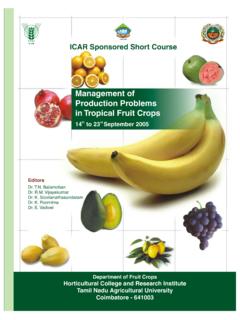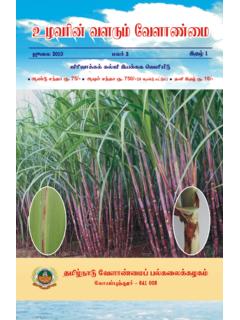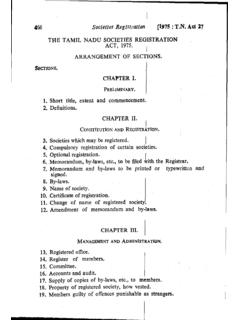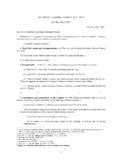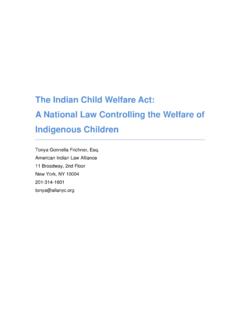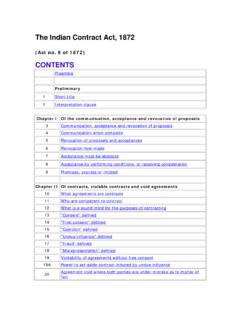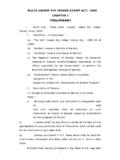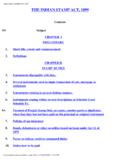Transcription of Indian Trusts Act 1882 - TNAU Agritech Portal
1 THE Indian Trusts ACT, 1882 . 1* ACT No. 2 OF 1882 . [13th January, 1882 .]. An Act to define and amend the law relating to Private Trusts and Trustees. it is expedient to define and amend the law relating to Preamble. private Trusts and trustees; It is hereby enacted as follows:- CHAPTER I. PRELIMINARY. 1. Short title. Act may be called the Indian Trusts Act, 1882 : and it shall come into force on the first day of March, 1882 . Local extent, *[It extends to 3*[the whole of India 4*[except the State of Jammu and Kashmir] and] the Andaman and Nicobar Islands 5**; but the Central Government may, from time to time, by notification in the Official Gazette, extend it to 6*[the Andaman and Nicobar Islands] or to any part thereof.]
2 ] But nothing herein contained affects the rules of Muhammadan law as to waqf, or the mutual relations of the members of an undivided family as determined by any customary or personal law, or applies to public or private religious or charitable endowments, or to Trusts to distribute prizes taken in war among the captors; and nothing in the Second Chapter of this Act applies to Trusts created before the said day. 2. Repeal of Statute and Acts mentioned in the Schedule hereto annexed shall, to the extent mentioned in the said Schedule, be repealed, in the territories to which this Act for the time being extends.
3 3. Interpretation-clause " trust ":-A " trust " is an obligation annexed to the ownership of property, and arising out of a confidence reposed in and accepted by the ---------------------------------------- ---------------------------- 1 The Act has been extended to Berar by the Berar Laws Act, 1941 (4. of 1941). Extended to and brought into force in Dadra and Nagar Havoli ( ) by Reg. 6 of 1963, and Extended to Goa, Daman and Diu by Re. 11 of 1963, s. 3 and Sch. The Act comes into force in Pondicherry on vide Reg. 7 of 1963, s. 3 and Sch. I. The Act shall come into force in the State of Sikkim on vide Notifn.
4 (E), Gaz. of India, Exty, pt. II (ii). 2 Subs. by the A. O. 1948 for the original words as amended by the A. O. 1937. 3 Subs. by the A. O. 1950 for "all the Provinces of India, except". Collected by the All India Christian Council, Page 1 of 32. 4 Subs. by Act 3 of 1951, and Sch., for "except Part B States". 5 The words "and Panth Piploda" omitted by the A. O. 1950. 6 Subs. by the A. O. 1950 for "either or both of the said Provinces". ---------------------------------------- ---------------------------- owner, or declared and accepted by him, for the benefit of another, or of another and the owner: "author of the trust ": the person who reposes or declares the confidence is called the "author of the trust ": the person who accepts the confidence is called the "trustee": the person for whose benefit the confidence is accepted is called the "beneficiary": the subject-matter of the trust is called " trust -property" or " trust -money".
5 The "beneficial interest" or "interest" of the beneficiary is his right against the trustee as owner of the trust -property; and the instrument, if any, by which the trust is declared is called the "instrument of trust ": "trustee": "beneficiary": " trust -property": "beneficial interest": "instrument of trust ": "breach of trust ": a breach of any duty imposed on a trustee, as such, by any law for the time being in force, is called a "breach of trust ": "registered": "notice": Expressions defined in Act 9 of in this Act, unless there be something repugnant in the subject or context, "registered".
6 Means registered under the law for the registration of documents for the time being in force: a person is said to have "notice" of a fact either when he actually knows that fact, or when, but for wilful abstention from inquiry or gross negligence, he would have known it, or when information of the fact is given to or obtained by his agent, under the circumstances mentioned in the Indian Contract Act, 1872 (9. of 1872), section 229; and all expressions used herein and defined in the Indian Contract Act, 1872, shall be deemed to have the meanings respectively attributed to them by that Act.
7 CHAPTER II. OF THE CREATION OF Trusts . 4. Lawful trust may be created for any lawful The purpose of a trust is lawful unless it is (a) forbidden by law, or (b) is of such a nature that, if permitted, it would defeat the provisions of any law, or (c) is fraudulent, or (d) involves or implies injury to the person or property of another, or (e) the Court Collected by the All India Christian Council, Page 2 of 32. regards it as immoral or opposed to public policy. Every trust of which the purpose is unlawful is void. And where a trust is created for two purposes, of which one is lawful and the other unlawful, and the two purposes cannot be separated, the whole trust is void.
8 This section the expression "law" includes, where the trust -property is immoveable and situate in a foreign country, the law of such country. Illustrations (a) A conveys property to B in trust to apply the profits to the nurture of female foundlings to be trained up as prostitutes. The trust is void. (b) A bequeaths property to B in trust to employ it in carrying on a smuggling business, and out of the profits thereof to support A's children. The trust is void. (c) A, while in insolvent circumstances, transfers property to B. in trust for A during his life, and after his death for B.
9 A is declared an insolvent. The trust for A is invalid as against his creditors. 5. trust of immoveable trust in relation to immoveable property is valid unless declared by a non-testamentary instrument in writing signed by the author of the trust or the trustee and registered, or by the will of the author of the trust or of the trustee. trust of moveable trust in relation to moveable property is valid unless declared as aforesaid, or unless the ownership of the property is transferred to the trustee. These rules do not apply where they would operate so as to effectuate a fraud.
10 6. Creation of to the provisions of section 5, a trust is created when the author of the trust indicates with reasonable certainty by any words or acts (a) an intention on his part to create thereby a trust , (b) the purpose of the trust , (c) the beneficiary, and (d) the trust -property, and (unless the trust is declared by will or the author of the trust is himself to be the trustee) transfers the trust -property to the trustee. Illustrations (a) A bequeaths certain property to B, "having the fullest confidence that he will dispose of it for the benefit of" C.
